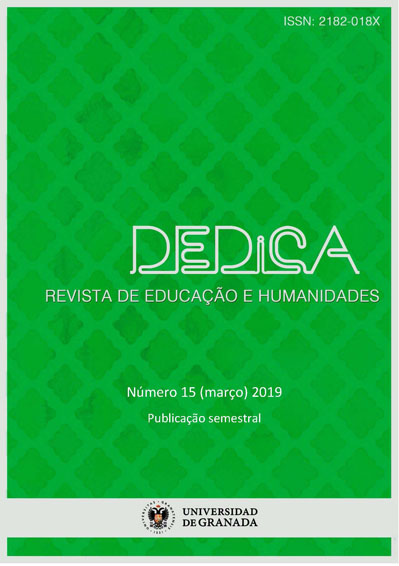Teaching the pragmatics of English at Tertiary Level from the framework of corpus linguistics methodology
DOI:
https://doi.org/10.30827/dreh.v0i15.8057Keywords:
Pragmatics, corpus linguistics, EFL, English, Tertiary LevelAbstract
In the present study, the importance of the inclusion of pragmatics teaching in the English as a foreign language classroom tertiary level is analyzed. Furthermore, a didactic proposal using corpus linguistics is presented. The reason for choosing compilations of texts assumes that the use of these texts will result in more appealing lessons for the students. The texts are, then, real communicative productions rather than artificial ones, which are normally presented to the students in their language lessons. The use of corpora in learning and teaching English as a Foreign Language also seeks (a) to improve the students’ autonomous learning and (b) to promote the development of their research abilities.
Downloads
References
Aijmer, K. (2009). Corpora and Language Teaching. Amsterdam: John Benjamins.
Bardovi-Harlig, K.; Mossman, S. & Vellenga, H. E. (2015). The effect of instruction on pragmatic routines in academic discussion. Language Teaching Research, vol. 19, 324-350.
Brown, P.; Levinson, S. (1987). Politeness. Some universals in language usage. Cambridge: Cambridge University Press.
Campoy-Cubillo, M. C. et al. (eds.). (2010). Corpus-based approaches to ELT. London/New York: Continuum.
Farr, F.; A. O’Keeffe, A. (2002). Would as a hedging device in an Irish context: An intra-varietal comparison of institutionalised spoken interaction. In R. Reppen, S. Fitzmaurice and D. Biber (eds.). Using Corpora to Explore Linguistic Variation. Amsterdam: John Benjamins, 25-48.
Fung, L.; R. Carter. (2007). Discourse markers and spoken English: Native and learner use in pedagogic settings. Applied Linguistics 28.3: 410-439.
Grice, P. (1975). Logic and conversation. In P. Cole & J. Morgan (Eds.), Syntax and Semantics, vol. 3: Speech acts (pp. 41–58). New York: Academic Press.
Hidalgo, E.; Quereda, L. & Santana, J. (eds.). (2007). Corpora in the foreign language classroom. Selected papers from the Sixth International Conference on Teaching and Language Corpora (TaLC6). Amsterdam: Rodopi.
Jucker, A. H. (ed.). (1995). Historical pragmatics. Pragmatic developments in the history of English. Amsterdam: John Benjamins.
Kasper, G. (2001). “Classroom research on interlanguage pragmatics” in Rose, K. R., & Kasper, G., Pragmatics in language teaching. Breinigsville, PA: Cambridge University Press.
Kasper, G.; Rose, K. R. (2002). Pragmatic development in a second language. Oxford: Blackwell.
Kasper, G.; Nguyen, H. t.; Yoshimi, D. R., & Yoshioka, J. K. (Eds.) (2010). Pragmatics & Language Learning Vol. 12. Honolulu: National Foreign Language Resource Center, University of Hawai’i at Manoa.
Kasper, G.; Wagner, J. (2011). Conversation analysis as an approach to second language acquisition. In D. Atkinson (Ed.), Alternative approaches to second language acquisition (pp. 117-142). New York: Routledge.
Leech, G. (1997). Teaching and language corpora: A convergence. In A. Wichmann, S. Fligelstone, T. McEnery and G. Knowles (eds.). Teaching and language corpora. New York: Addison Wesly Longman.
Minegishi Cook, H. (2001). “Why can’t learners of JFL distinguish polite from impolite speech styles?” in Rose, K. R., & Kasper, G., Pragmatics in language teaching. Breinigsville, PA: Cambridge University Press.
Niezgoda, K.; Röver, C. (2001). “Pragmatic and grammatical awareness. A function of the learning environment?” in Rose, K. R., & Kasper, G., Pragmatics in language teaching. Breinigsville, PA: Cambridge University Press.
Römer, U. (2004). A corpus-driven approach to modal auxiliaries and their didactics. In J. Sinclair (ed.). How to use corpora in language teaching. Amsterdam: John Benjamins, 185-199.
Rose, K. R.; Kasper, G. (2001). Pragmatics in language teaching. Breinigsville, PA: Cambridge University Press.
Rose, K. R.; Kasper, G. (Eds.) (2001). Pragmatics in language teaching. Cambridge: Cambridge University Press.
Ross, S. J.; Kasper, G. (Eds.) (2013). Assessing second language pragmatics. Basingstoke, Hampshire, UK: Palgrave Macmillan.
Searle, J. (1969). Speech Acts: An Essay in the Philosophy of Language, Cambridge, 1969.












